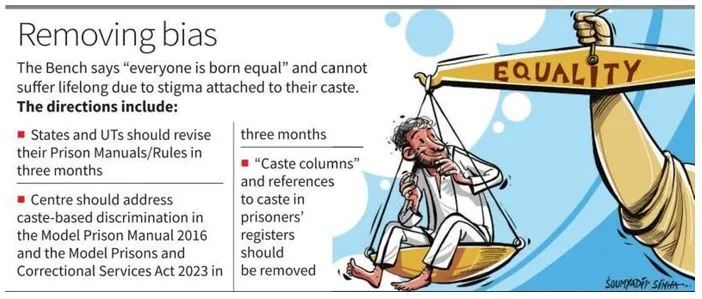

4th October 2024 (17 Topics)
Context
The Supreme Court of India recently ruled against caste-based discrimination in prisons, declaring several provisions in jail manuals unconstitutional. This landmark decision is aimed at addressing the long-standing practices that marginalize certain communities, particularly Scheduled Castes (SC), Scheduled Tribes (ST), and Denotified Tribes (DNT).
Key Points Made by the Supreme Court
- Violation of Fundamental Rights: The Court held that caste-based discrimination in prisons violates Articles 14 (equality before law), 15 (prohibition of discrimination), and 21 (right to life with dignity) of the Constitution.
- Directive for Immediate Reforms: The Court directed all states and Union Territories to revise their prison manuals within three months to eliminate discriminatory provisions.
- SC also directed Centre to make necessary changes to address caste-based discrimination in the Model Prison Manual, 2016 and the Model Prisons and Correctional Services Act, 2023 within a period of three months.

- Critique of Caste-Based Labor Assignments: The Court condemned the practice of assigning menial tasks to marginalized communities, arguing that it perpetuates caste hierarchies and fails to aid in the reformation and rehabilitation of prisoners.
- Caste as a Basis for Discrimination: The judgment criticized the notion of categorizing inmates based on caste, asserting that this practice is an outdated remnant of colonial and pre-colonial systems designed to dehumanize individuals.
- Forced Labor and Human Dignity: The Court ruled that the selective assignment of menial jobs amounts to forced labor, violating the constitutional rights of marginalized communities.
- Specific Recommendations: The Court ordered the removal of caste-related references in prison records and manuals, emphasizing the need to provide an environment that respects equality and dignity for all inmates.
- Condemnation of Practices Against DNTs: The Court particularly targeted the systemic discrimination against Denotified Tribes, urging states to review classifications that treat them as habitual criminals.
Prevalence of Casteism in Jail
- Historical Context: Casteism in prisons has roots in colonial-era practices, where the British utilized caste divisions as a means of control. The persistence of these discriminatory practices reflects deep-seated societal biases.
- Discriminatory Labor Assignments: In many prisons, inmates from marginalized communities are assigned menial tasks, such as cleaning and maintenance, while higher caste inmates are given roles perceived as more respectable, such as cooking.
- Segregation and Isolation: Inmates from certain castes may face segregation within the prison system, exacerbating social hierarchies and reinforcing stigma even in confinement.
- Forced Labor Practices: Reports have documented instances where marginalized inmates are compelled to perform hazardous jobs, such as cleaning sewers, often under unsafe and degrading conditions.
- Stereotyping and Stigmatization: The classification of certain groups, particularly DNTs, as habitual criminals perpetuates negative stereotypes and social stigma, affecting their treatment both inside and outside the prison system.
Reasons Behind Caste-Based Discrimination in Prisons
- Colonial Legacy: The structure of Indian prisons is influenced by colonial practices that used caste as a means of control and subjugation, leading to entrenched biases that persist today.
- Societal Norms: The broader societal acceptance of caste hierarchies contributes to discriminatory practices within prisons, reflecting the stigmatization of certain communities.
- Lack of Oversight and Accountability: Inadequate monitoring and oversight of prison regulations allow for the continuation of discriminatory practices without accountability, often embedded in outdated legal frameworks.
- Insufficient Legal Protections: While there are laws prohibiting caste-based discrimination, enforcement is often weak, and many provisions are outdated or not aligned with contemporary human rights standards.
- Cultural Attitudes: Deep-rooted cultural attitudes regarding caste and social hierarchy contribute to the persistence of discrimination, affecting both prison staff and inmate interactions.



